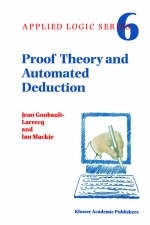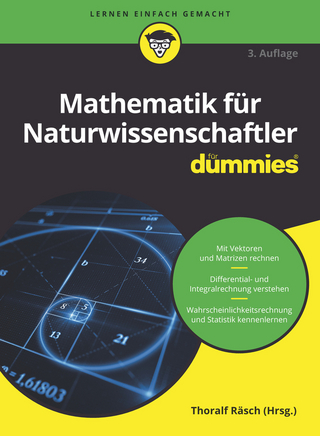
Proof Theory and Automated Deduction
Kluwer Academic Publishers (Verlag)
9781402003684 (ISBN)
1 Introduction.- 1 Overview.- 2 Classical Propositional Logic.- 1 Syntax.- 2 Semantics.- 3 Deduction Systems.- 4 Automated Proof Methods.- 5 Digressions.- 3 Other Propositional Logics.- 1 Introduction.- 2 Intuitionistic Logic.- 3 Normalisation and Cut Elimination.- 4 Semantics of Intuitionistic Logic.- 5 Relating Intuitionistic and Classical Logic.- 6 Additive and Multiplicative Connectives.- 7 Linear Logic.- 4 The Curry-Howard Correspondence.- 1 Introduction.- 2 Typed ?-Calculus and Natural Deduction.- 3 Combinatory Logic and Hilbert-Style Axioms.- 4 Applications of the Curry-Howard Correspondence.- 5 Modal and Temporal Logics.- 1 Introduction and Motivation.- 2 S4 and Non-Monotonic Logics.- 3 Other Modal Logics of Interest in Computer Science.- 4 Model-Checking.- 6 First-Order Classical Logic.- 1 Definitions.- 2 Semantics.- 3 Deduction Systems.- 4 Expressive Power.- 5 Meta-Mathematical Properties.- 6 Digressions.- 7 Resolution.- 1 Fundamental Ideas.- 2 Unification.- 3 Resolution.- 4 Optimisations.- 5 Resolution as Cut-Only Proofs.- 8 Tableaux, Connections and Matings.- 1 First-Order Tableaux.- 2 Free Variable Tableaux.- 3 Connections, Matings and Model Elimination.- 9 Incorporating Knowledge.- 1 Motivations.- 2 Equality and Rewriting.- 3 Equational Theories.- 4 Other Theories.- 10 Logic Programming Languages.- 1 Introduction.- 2 Prolog.- 3 Constraints.- 4 Parallelism.- Appendix A Answers to Exercises.- Appendix B Basics of Topology.
| Reihe/Serie | Applied Logic Series ; 6 |
|---|---|
| Zusatzinfo | 444 p. |
| Sprache | englisch |
| Maße | 155 x 235 mm |
| Themenwelt | Mathematik / Informatik ► Mathematik ► Allgemeines / Lexika |
| Mathematik / Informatik ► Mathematik ► Logik / Mengenlehre | |
| ISBN-13 | 9781402003684 / 9781402003684 |
| Zustand | Neuware |
| Informationen gemäß Produktsicherheitsverordnung (GPSR) | |
| Haben Sie eine Frage zum Produkt? |
aus dem Bereich


